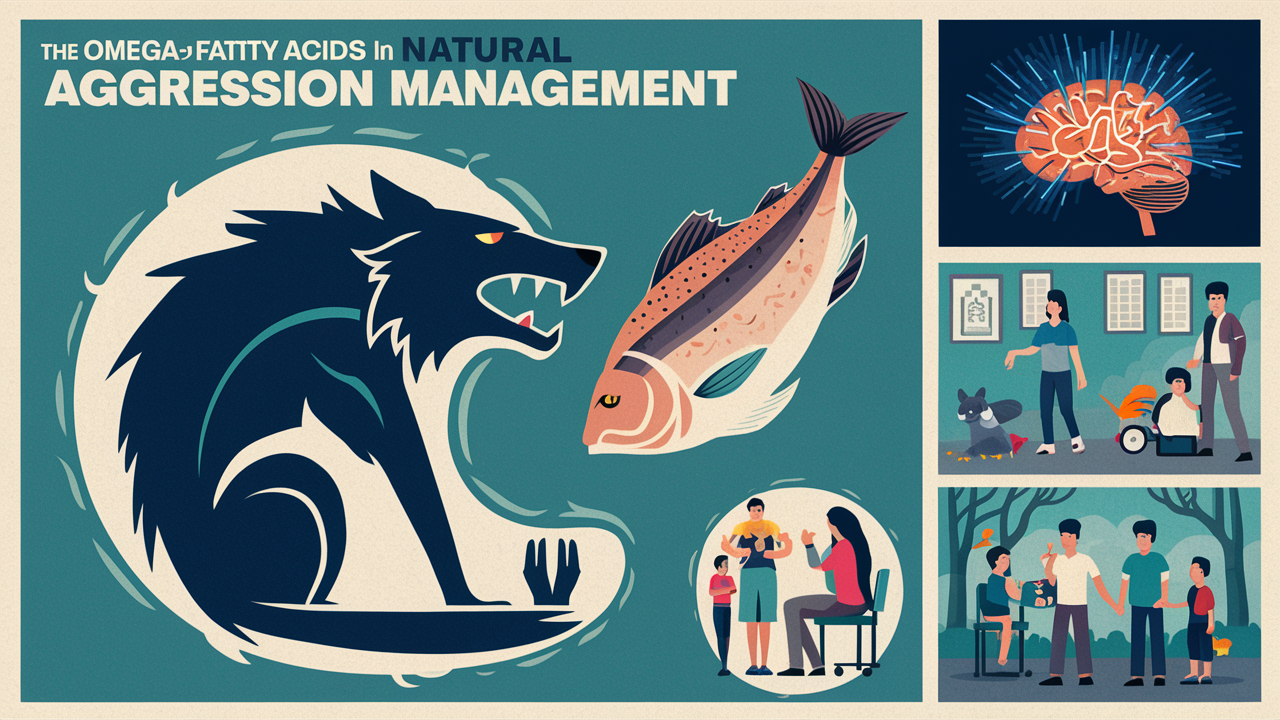Discover how Omega-3 fatty acids can help reduce aggression naturally. This comprehensive guide covers the benefits, scientific evidence, and practical ways to include Omega-3s in your diet.
Aggression is a natural human emotion that can manifest in various forms, from verbal outbursts to physical confrontations. While it’s a normal part of human behavior, excessive aggression can lead to significant personal and social challenges. In recent years, there’s been a growing interest in finding natural ways to manage and reduce aggression. One promising avenue is the use of Omega-3 fatty acids, which are known for their numerous health benefits, including their positive impact on brain health. This article explores the potential of Omega-3 fatty acids to help reduce aggression naturally, providing insights into how they work, the scientific evidence supporting their use, and practical ways to incorporate them into your diet.
2. Understanding Aggression
Aggression can be defined as any behavior intended to harm another person who is motivated to avoid that harm. It can take many forms, including physical violence, verbal abuse, and passive-aggressive behaviors. The causes of aggression are multifaceted and can be broadly categorized into biological, psychological, and environmental factors.
Biologically, aggression can be influenced by genetic factors, hormonal imbalances (such as high levels of testosterone), and neurological conditions. Psychological factors include personality traits, mental health disorders (such as anxiety and depression), and past traumatic experiences. Environmental factors encompass a wide range of influences, including family dynamics, cultural norms, socioeconomic status, and exposure to violence.
The impact of aggression is far-reaching. On a personal level, it can strain relationships, reduce job performance, and lead to legal consequences. Socially, high levels of aggression can contribute to community violence, disrupt educational environments, and strain healthcare and criminal justice systems. Understanding these aspects of aggression is crucial for identifying effective ways to manage and reduce it.
3. The Role of Omega-3 Fatty Acids in Brain Health
Omega-3 fatty acids are essential fats that the body cannot produce on its own, making it necessary to obtain them from dietary sources. The three main types of Omega-3 fatty acids are Alpha-linolenic acid (ALA), Eicosapentaenoic acid (EPA), and Docosahexaenoic acid (DHA). These fats are crucial for maintaining overall health, particularly brain health.
Omega-3 fatty acids are found in high concentrations in the brain and play a vital role in cognitive functions, such as memory, attention, and problem-solving. They are integral components of cell membranes and help regulate neurotransmitter function, reduce inflammation, and promote neuroplasticity—the brain’s ability to reorganize itself by forming new neural connections.
Sources of Omega-3 fatty acids include fatty fish (such as salmon, mackerel, and sardines), flaxseeds, chia seeds, walnuts, and Omega-3 supplements. Ensuring an adequate intake of these fats is essential for maintaining optimal brain function and overall health.
The mechanisms by which Omega-3 fatty acids influence brain function are complex. They help maintain the fluidity of cell membranes, which is crucial for efficient cell signaling. Omega-3s also modulate the production of neurotransmitters, such as serotonin and dopamine, which play key roles in mood regulation and behavior. Additionally, they possess anti-inflammatory properties that can protect the brain from damage caused by chronic inflammation—a condition linked to various mental health disorders, including aggression.

4. Scientific Evidence Supporting Omega-3 Fatty Acids for Reducing Aggression
The potential of Omega-3 fatty acids to reduce aggression has been the subject of numerous scientific studies. One notable study published in the journal Nutritional Neuroscience explored the effects of Omega-3 supplementation on aggressive behavior in a population of young adults. The study found that participants who received Omega-3 supplements exhibited significantly lower levels of aggression compared to those who received a placebo.
Another study, conducted by researchers at the University of Pennsylvania, examined the impact of Omega-3 supplementation on aggression in children with attention-deficit/hyperactivity disorder (ADHD). The results indicated that Omega-3 supplements led to a reduction in aggressive behaviors, highlighting the potential of these fats to benefit not only adults but also children with behavioral disorders.
In addition to these studies, a meta-analysis of randomized controlled trials (RCTs) published in the Journal of Child Psychology and Psychiatry concluded that Omega-3 supplementation is associated with a modest but significant reduction in aggressive behavior. The analysis suggested that the anti-inflammatory and neuroprotective properties of Omega-3 fatty acids might underlie their beneficial effects on aggression.
While the evidence is promising, it’s important to note that the effectiveness of Omega-3 supplementation can vary depending on factors such as dosage, duration of use, and individual differences. The typical recommended dosage for achieving therapeutic effects ranges from 1 to 3 grams of combined EPA and DHA per day. However, consulting with a healthcare professional is essential before starting any supplementation regimen to ensure safety and appropriateness for individual needs.
5. Practical Ways to Incorporate Omega-3 Fatty Acids into Your Diet
Incorporating Omega-3 fatty acids into your diet can be achieved through a combination of dietary sources and supplements. Here are some practical ways to ensure you get enough Omega-3s:
- Consume Fatty Fish: Aim to include fatty fish, such as salmon, mackerel, sardines, and trout, in your diet at least twice a week. These fish are rich sources of EPA and DHA, the most beneficial forms of Omega-3 fatty acids.
- Include Plant-Based Sources: For those who prefer plant-based options, flaxseeds, chia seeds, and walnuts are excellent sources of ALA, which the body can partially convert to EPA and DHA. Adding these to smoothies, salads, or oatmeal can boost your Omega-3 intake.
- Use Omega-3 Enriched Products: Look for products fortified with Omega-3s, such as eggs, milk, and yogurt. These can be convenient ways to increase your intake without significant changes to your diet.
- Take Omega-3 Supplements: If dietary sources are insufficient, consider taking Omega-3 supplements. Fish oil capsules are a popular option, but there are also plant-based supplements made from algae oil, which are suitable for vegetarians and vegans.
- Incorporate Omega-3 Rich Recipes: Try recipes that incorporate Omega-3-rich ingredients. For example, a salad with grilled salmon, walnuts, and a flaxseed oil dressing can be a delicious and nutritious meal. Smoothies with chia seeds and flaxseed can also be a great way to start your day with a boost of Omega-3s.
In addition to these dietary tips, it’s essential to consider the quality of the Omega-3 sources. Opt for wild-caught fish over farmed fish, as they tend to have higher levels of Omega-3s and lower levels of contaminants. When choosing supplements, look for reputable brands that provide third-party testing to ensure purity and potency.
6. Success Stories and Case Studies
Real-life success stories and case studies can provide valuable insights into the practical benefits of Omega-3 fatty acids for reducing aggression. Here are a few examples:
Case Study 1: John’s Transformation
John, a 35-year-old professional, struggled with frequent outbursts of anger and frustration. After learning about the potential benefits of Omega-3s, he decided to incorporate more fatty fish into his diet and started taking a high-quality fish oil supplement. Within a few months, John noticed a significant reduction in his aggressive tendencies. He felt calmer, more focused, and better able to manage stressful situations.
Case Study 2: Lisa’s Journey
Lisa, a mother of two, was concerned about her teenage son’s aggressive behavior. After consulting with a healthcare professional, she began supplementing his diet with Omega-3s through fish oil capsules. Over time, Lisa observed a noticeable improvement in her son’s behavior. He became less irritable and more cooperative, both at home and in school.

Case Study 3: The School Program
A school in New York implemented a program to address behavioral issues among students by providing daily Omega-3 supplements. The program, which included regular monitoring and support, resulted in a significant decrease in incidents of aggression and improved overall student behavior. The success of this program highlights the potential of Omega-3s to positively impact children’s behavior in educational settings.
These stories underscore the real-world impact of Omega-3 fatty acids on reducing aggression. While individual results may vary, these examples provide hope and encouragement for those seeking natural ways to manage aggressive behavior.
7. Frequently Asked Questions (FAQs)
Q1: Can Omega-3 fatty acids completely cure aggression?
While Omega-3 fatty acids can significantly reduce aggression, they are not a cure-all. Aggression is a complex behavior influenced by multiple factors, and a holistic approach, including dietary changes, therapy, and lifestyle modifications, is often necessary for effective management.
Q2: How long does it take to see results from Omega-3 supplements?
The time it takes to see results from Omega-3 supplementation can vary. Some individuals may notice improvements within a few weeks, while others may take several months. Consistency and adherence to the recommended dosage are key for achieving the best results.
Q3: Are there any side effects of consuming too much Omega-3?
While Omega-3 fatty acids are generally safe, consuming excessively high doses can lead to side effects such as digestive discomfort, increased bleeding risk, and interactions with certain medications. It’s important to follow the recommended dosage and consult with a healthcare professional before starting supplementation.
Q4: What are the best sources of Omega-3 for vegetarians and vegans?
Vegetarians and vegans can obtain Omega-3s from plant-based sources such as flaxseeds, chia seeds, hemp seeds, and walnuts. Additionally, algae oil supplements provide a direct source of EPA and DHA, making them a suitable

Health Disclaimer
The information provided in this blog is for informational purposes only and should not be considered medical advice. Always consult with a healthcare professional before making any health-related decisions or starting any new dietary or supplement regimen.
Conclusion
Incorporating Omega-3 fatty acids into your diet can be a powerful and natural way to help manage and reduce aggression. The scientific evidence supporting their benefits is compelling, demonstrating improvements in brain health and behavior. By understanding the sources and mechanisms of Omega-3s, you can make informed choices to include them in your diet through food and supplements. Real-life success stories and practical tips provide further encouragement to explore this natural approach.
While Omega-3s are not a standalone solution and should be part of a comprehensive strategy for managing aggression, their role in promoting mental well-being and reducing aggressive tendencies is significant. As with any dietary change or supplementation, it’s essential to consult with a healthcare professional to ensure safety and appropriateness for your individual needs. Embracing Omega-3 fatty acids can be a step towards a calmer, more balanced life, contributing positively to both personal and social well-being.









The breakdown of the different types of omega-3s and their potential benefits for reducing aggression was helpful. I convinced my parents to buy some fish oil supplements with EPA and DHA, and I’ve definitely noticed an improvement. I feel more in control of my emotions and less likely to react impulsively. This blog post is a game-changer for me! Thanks for the info 🙂